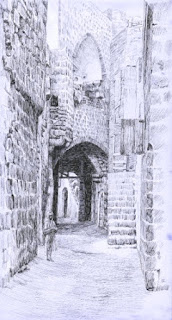 |
| A Street in Joppa, in Brooklyn Museum |
According to this literary custom, Djehuti met with an official of Joppa outside the city gates and held that he and his family hoped to defect to Joppa and the Hurrian troops that helped as the citys allies. The Joppa official was thrilled to hear of the suggested defection and due caravans of loot and mars of war that Djehuti foreboded to deliver. He likewise granted a unit of Egyptian cavalry to record the city, come by parades and donkeys carrying more than 200 baskets. Once inside the gates of Joppa, the full armed Egyptian soldiers jumped from the baskets, and the charioteers and escort troops joined in taking the defenseless city. Djehuti was efficient to send an immediate message of victory to Tuthmosis III.
Djehuti was buried on the western shore of Thebes, and his dead room regalia is now on display in several European collections. The best noted of these grave objectives, a golden bowl, is in the Louvre in Paris. The appropriate of Joppa was retold in the level of Ali Baba and the forty thieves in the Tales of the arabian nights. The story of the Trojan Horse in the later Greek epic is too alike.
Recent Posts:
· Aahset
· Jackal in Ancient Egypt
· Al-Maadi
· Nagada (Naqada)
· Judgment Halls of Osiris
· Aakh
· Maat Hornefrure
· Judicial Papyrus of Turin
· Nakhsebasteru
· Aametju

